限定词
英语语法---限定词

限定词(determiner)限定词的先后顺序: 前位---中位---后位(一个名词中心词之前不可并用两个前位限定词或两个中位限定词)冠词的表意功能(1)The ten of them have passed the final examination.Ten of them have passed the final examination.Ten of the (these/his) students have passed the final examination.(2)They asked to stop counting presidential votes for a second time.(3)Every boy and every girl___(have) his merits.Every young man, young lady,and child ___(be) requested to take part.Many a person___(be) going to the take the test.(4)Other or anotherCalifornia covers a large area than __________state except Alaska and Texas.Out of the three foreign guests, one is from Frankfurt, ______two are from Vienna.. Don'.los.heart.Hav.___try.There's room for _________people in the back of the bus.(5). ing.We'l.hav.____.five-da.holiday.(6)冠词的用法Who is ___captain of your team?. Mr.Reaga.wa.electe.___Presiden.o.th.Unite.State.i.1980.Charles Dickens,__author of David Copperfield, was a distinguished English novelist.As ____physician, he does not deserve much praise.He was covered with snow from ___head to __foot.The relation between ___teacher and ___student is excellent.This room serves the triple purpose of ___study, ___bedroom and ____sitting room. The old man was sitting in a chair, ___pipe in ___hand.He sat at ___ table, ___coat off, ___head down, and __pen in ___hand.What kind of ___man is he?What sort of ___book do you want?The work is ____pleasure to me.She has developed ___love for labour.Physics is ____ science.He spoke with _____ enthusiasm which inspired us all.Do you like ___ music of ___film?Phonetics is ____science of speech sounds。
英语中的限定词
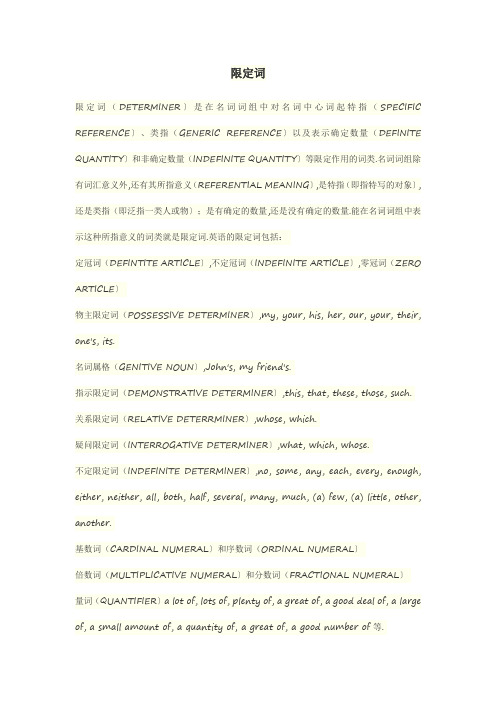
限定词限定词(DETERMINER〕是在名词词组中对名词中心词起特指(SPECIFIC REFERENCE〕、类指(GENERIC REFERENCE〕以及表示确定数量(DEFINITE QUANTITY〕和非确定数量(INDEFINITE QUANTITY〕等限定作用的词类.名词词组除有词汇意义外,还有其所指意义(REFERENTIAL MEANING〕,是特指(即指特写的对象〕,还是类指(即泛指一类人或物〕;是有确定的数量,还是没有确定的数量.能在名词词组中表示这种所指意义的词类就是限定词.英语的限定词包括:定冠词(DEFINTITE ARTICLE〕,不定冠词(INDEFINITE ARTICLE〕,零冠词(ZERO ARTICLE〕物主限定词(POSSESSIVE DETERMINER〕,my, your, his, her, our, your, their, one's, its.名词属格(GENITIVE NOUN〕,John's, my friend's.指示限定词(DEMONSTRATIVE DETERMINER〕,this, that, these, those, such.关系限定词(RELATIVE DETERRMINER〕,whose, which.疑问限定词(INTERROGATIVE DETERMINER〕,what, which, whose.不定限定词(INDEFINITE DETERMINER〕,no, some, any, each, every, enough, either, neither, all, both, half, several, many, much, (a) few, (a) little, other, another.基数词(CARDINAL NUMERAL〕和序数词(ORDINAL NUMERAL〕倍数词(MULTIPLICATIVE NUMERAL〕和分数词(FRACTIONAL NUMERAL〕量词(QUANTIFIER〕a lot of, lots of, plenty of, a great of, a good deal of, a large of, a small amount of, a quantity of, a great of, a good number of等.限定词与名词词组中心词之间有着某种固定的搭配关系;如果名词之前带有两个或两个以上的限定词,则限定词与限定词之间也有某种固定的搭配关系.本讲主要解决这两种搭配关系问题.1 限定词与三类名词的搭配关系限定词的选择决定于随后的名词的类别,是单数名词、复数名词,还是不可数名词.1〕能与三类名词搭配的限定词有些限定词如the, some, any, no, other, whose以及my, your等物主限定词和名词属格(John's, my friend's〕等能与三类名词搭配.例如:the book, my book, my friend's book, John's book, any book, some book, no book, the other book, whose book, the books,my books, my friend's book, John's books, any books, some books, no books, the other books, whose books, the money, my money, my friend's money, John's money, any money,some money, no money, the other money, whose money.2〕只能与单数名词搭配的限定词有些限定词如a(n), one, another, each, every, either, neither, many a, such a 等只能与单数名词搭配.例如:each worker, either book, an apple, another book, such a book, every student, neither sentence, one copy, many a book.3) 只能与复数名词搭配的限定词有些限定词如both, two, three, another two / three, many, (a) few, several, these, those, a (great) number of等只能与复数名词搭配.例如:both workers, several students, a number of essays, many students, (a) few words, these / those books, two / three visitors, another two / three students.4) 只能与不可数名词搭配的限定词有些限定词如a (little) bit of, a great amount of, a great deal of, (a) little, much 等只能与不可数名词搭配.例如:a bit of water, a great amount of labour, a great deal of work, (a) little space, much noise.5〕能与单、复数名词搭配的限定词有些限定词如the first, the second, the last, the next等既可与单数名词搭配,也可与复数名词搭配.例如:the first rose, the last man, the next meeting, the first roses, the last men, the next meetings.6〕能与单数名词和不可数名词搭配的限定词有些限定词如this, that, (the) least等能与单数名词和不可数名词搭配.例如:(the) least sign (of prejudice), this / that job, (the) least knowledge, this / that work.7〕能与复数名词和不可数名词搭配的限定词还有些限定词如a lot of, lots of, enough, more, most, such, other等可与复数名词和不可数名词搭配.例如:a lot of books, a lot of money, lots of chickens, lots of food, plenty of chairs, plenty of water, enough copies, enough coal, more articles, more time, most people, most work, such men, such bread, other men, other bread.不定量限定词less原先只与不可数名词搭配,但在现代英语中,less既可与不可数名词也可与复数名词搭配.例如:less money, less mistakes.2 限定词与限定词的搭配关系以上讲的是限定词与三类名词的搭配关系.除上述搭配关系外,限定词与限定词之间还存在着一定的搭配关系.在名词词组中心词之前如果有两个或两个以上限定词出现时,就会产生限定词的先后顺序问题.按其不同的搭配位置,限定词可分为:1〕中位、前位、后位限定词按照限定词与限定词之间不同搭配位置,限定词可分为中位限定词(CENTRAL DETERMINER〕、前位限定词(PREDETERMINER〕和后位限定词(POSTDETERMINER〕.a) 中位限定词包括a(n), the, zero; this, that, these, those; my, your, etc; Merry's, my friend's; some, any, no, every, each, either, neither, enough; what(ever), which(ever), whose等b) 前位限定词包括all, both, half; double, twice, three times, etc; one-third, two-fifths, etc; what, such, (a / an)等c) 后位限定词包括one, two, three, etc; first, second, third, etc; next, last, other, another, etc; many, much, (a) few, (a) little, fewer, (the) fewest, less, (the) least, more, most; several, plenty of, a lot of, lots of, a great / large / good number of, a great / good deal of, a large / small amount of; such等2) 三类限定词的搭配关系如果一个名词词组带有上述三类限定词,其搭配关系总是按照"前位--中位--后位"的顺序排列.例如:all前the中four后teachers.all前your中three后books.all前these中last后few后days.如果只有上述两类限定词,其搭配关系仍按上述顺序.例如:half前his中lecture.those中last后few后months.several后hundred后guests.all前other后students.such前a中misfortune.some中such后alloy.由上述诸例可以看出,中位限定词之间和前位限定词之间是互相排拆的,即一个名词中心词之前不可并用两个中位限定词或两个前位限定词.所以,"我的那本书"不是* my that book 而是that book of mine,因为my和that同是中位限定词,不可同时并列.但后位限定词的使用却不受此限.除上述those last few months, several hundred guests之外, this last two books, the first two chapters, three other girls, two more sheets, the next few weeks, many more copies, a few more samples, another twenty tons 等都是后位限定词重叠使用的实例.个别限定词有跨类现象,如such既属于前位限定词,又可归入后位限定词.由于它只是在such a...和such an...这样的搭配中属于前位限定词,而在与其他限定词(some, any, no, all, few, another, other, many, one, two, etc)搭配时,such则是后位限定词,一律放在上述这些限定词的后面,如some such, any such, nosuch, few such, one such等。
限定词

我们还应该注意这两种用法的意思区别。 ①I will stay here for another three days. 意思 是“我还要在这里再呆三天”。“another+数 词+名词复数”这一结构的基本意思是“在原 有基础上的一个延续”。 ②I am always busy from Monday to Thursday, but I can come on three other days. 意思是“我 其他三天(Friday, Saturday, and Sunday)能 来”。“数词+other+名词复数”这一结构只 是单纯地表示“其他的…,另外的…”。
3、不定限定词some, any
⑴ 从与名词搭配来看,some和any均可以与不可 数名词和可数名词复数连用,表示“一些”。 some一般用在肯定句中;而any一般用在否定 句中。例如: ①Clint is busy. He always has some work to do. But John is lazy. He never does any work. ②Last night I was very hungry and I wanted some food to eat. But now I am not hungry and I don’t want any food to eat. ③I need some medicine to cure my cough. ④I want to buy some computer books. ⑤I don’t have any friend here.
this, these, that, those 既可以是形容词,放在名 词或one,ones之前作定语;也可以是代词,代 替名词或名词短语;还可以作副词,表程度。 如: I don’t like this book, I like that one. I don’t like this, it’s too difficult. Yesterday I bought a water-melon, this big.
高中英语-限定词
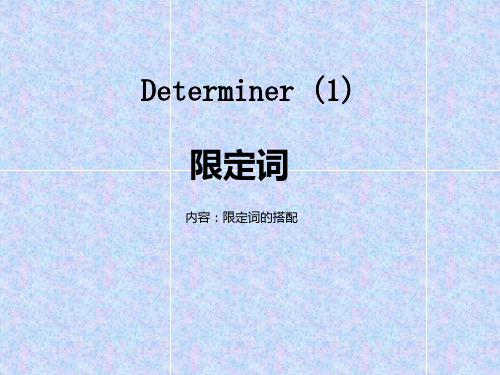
Translate the following into English, using appropriate determiners: 1.开凿隧道需要大量劳动力(labor). 2. 少说空话(empty talk)多干实事(practical work)。 3. 今天参观展览会的人数比昨天少。 4. 安娜(Anna)因为没有足够的钱财而 烦恼丛生。
· There are few things I enjoy more than watching
fish swimming in the stream.
4.只能与不可数名词搭配的限定词
• 有些限定词如:a (little) bit of , a large amount of , a great deal of , (a) little , much less, (the) least等只能与 不可数名词搭配。例如: a bit of water a large amount of money much noise (a) little space less oil (the) least oil · There is little doubt that he and his accomplices are guilty. · The Square was the scene of much fighting in last year’s revolution. ·I can speak a bit of French and understand more .
6.能与单数名词和不可数名词搭配的限定词
有些限定词,如:this , that 等,能与单数名词和 不可数名词搭配。例如: this/that job this/that work · Whoever had come up with this idea deserved a medal. · My family have lived in that village for many generations. · I hope to enjoy that feeling again before long .
限定词的用法
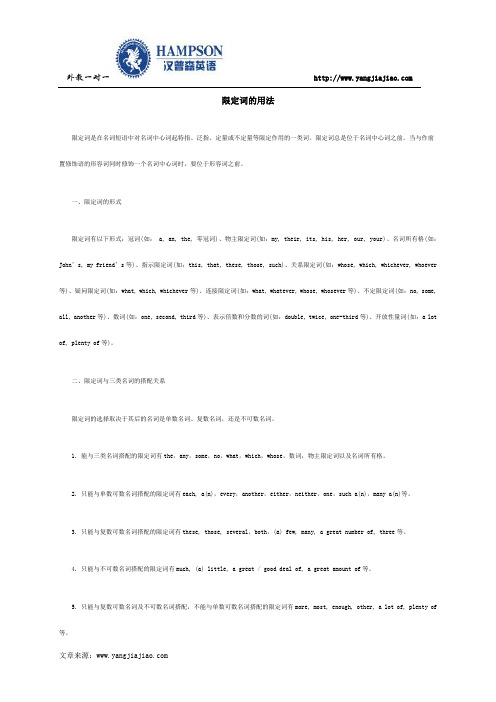
外教一对一限定词的用法限定词是在名词短语中对名词中心词起特指、泛指、定量或不定量等限定作用的一类词。
限定词总是位于名词中心词之前。
当与作前置修饰语的形容词同时修饰一个名词中心词时,要位于形容词之前。
一、限定词的形式限定词有以下形式:冠词(如: a, an, the, 零冠词)、物主限定词(如:my, their, its, his, her, our, your)、名词所有格(如:John’s, my friend’s等)、指示限定词(如:this, that, these, those, such)、关系限定词(如:whose, which, whichever, whoever 等)、疑问限定词(如:what, which, whichever等)、连接限定词(如:what, whatever, whose, whosever等)、不定限定词(如:no, some, all, another等)、数词(如:one, second, third等)、表示倍数和分数的词(如:double, twice, one-third等)、开放性量词(如:a lot of, plenty of等)。
二、限定词与三类名词的搭配关系限定词的选择取决于其后的名词是单数名词、复数名词,还是不可数名词。
1. 能与三类名词搭配的限定词有the,any,some,no,what,which,whose,数词,物主限定词以及名词所有格。
2. 只能与单数可数名词搭配的限定词有each, a(n),every,another,either,neither,one,such a(n),many a(n)等。
3. 只能与复数可数名词搭配的限定词有these, those, several,both,(a) few, many, a great number of, three等。
4. 只能与不可数名词搭配的限定词有much, (a) little, a great / good deal of, a great amount of等。
限定词的具体分类和用法详解
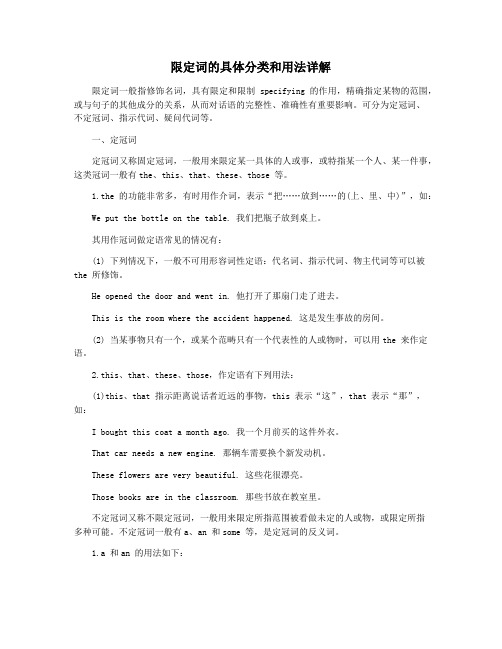
限定词的具体分类和用法详解限定词一般指修饰名词,具有限定和限制specifying 的作用,精确指定某物的范围,或与句子的其他成分的关系,从而对话语的完整性、准确性有重要影响。
可分为定冠词、不定冠词、指示代词、疑问代词等。
一、定冠词定冠词又称固定冠词,一般用来限定某一具体的人或事,或特指某一个人、某一件事,这类冠词一般有the、this、that、these、those 等。
1.the 的功能非常多,有时用作介词,表示“把……放到……的(上、里、中)”,如:We put the bottle on the table. 我们把瓶子放到桌上。
其用作冠词做定语常见的情况有:(1) 下列情况下,一般不可用形容词性定语:代名词、指示代词、物主代词等可以被the 所修饰。
He opened the door and went in. 他打开了那扇门走了进去。
This is the room where the accident happened. 这是发生事故的房间。
(2) 当某事物只有一个,或某个范畴只有一个代表性的人或物时,可以用the 来作定语。
2.this、that、these、those,作定语有下列用法:(1)this、that 指示距离说话者近远的事物,this 表示“这”,that 表示“那”,如:I bought this coat a month ago. 我一个月前买的这件外衣。
That car needs a new engine. 那辆车需要换个新发动机。
These flowers are very beautiful. 这些花很漂亮。
Those books are in the classroom. 那些书放在教室里。
不定冠词又称不限定冠词,一般用来限定所指范围被看做未定的人或物,或限定所指多种可能。
不定冠词一般有a、an 和some 等,是定冠词的反义词。
1.a 和an 的用法如下:(1)a 用于以元音音素(a、e、i、o、u) 开头的单数可数名词前,而an 则用于以辅音音素开头的单数可数名词前。
英语中的五种限定词
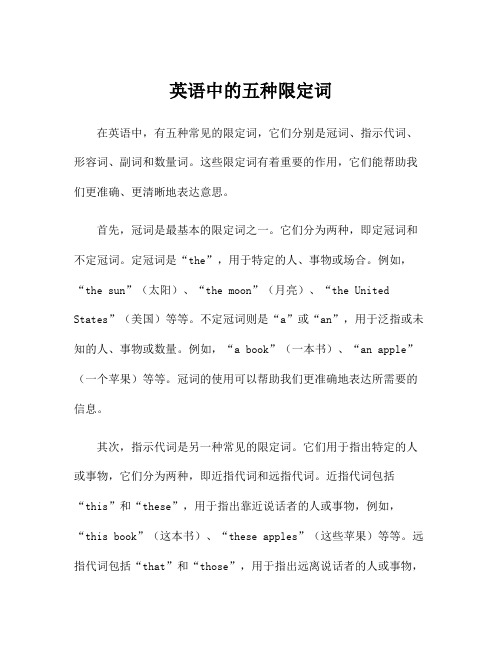
英语中的五种限定词在英语中,有五种常见的限定词,它们分别是冠词、指示代词、形容词、副词和数量词。
这些限定词有着重要的作用,它们能帮助我们更准确、更清晰地表达意思。
首先,冠词是最基本的限定词之一。
它们分为两种,即定冠词和不定冠词。
定冠词是“the”,用于特定的人、事物或场合。
例如,“the sun”(太阳)、“the moon”(月亮)、“the United States”(美国)等等。
不定冠词则是“a”或“an”,用于泛指或未知的人、事物或数量。
例如,“a book”(一本书)、“an apple”(一个苹果)等等。
冠词的使用可以帮助我们更准确地表达所需要的信息。
其次,指示代词是另一种常见的限定词。
它们用于指出特定的人或事物,它们分为两种,即近指代词和远指代词。
近指代词包括“this”和“these”,用于指出靠近说话者的人或事物,例如,“this book”(这本书)、“these apples”(这些苹果)等等。
远指代词包括“that”和“those”,用于指出远离说话者的人或事物,例如,“that house”(那栋房子)、“those mountains”(那些山)等等。
指示代词的使用可以帮助我们在交流中更加清晰。
第三,形容词是一种用于描述名词的限定词。
它们可以用来描述人、事物、地点等等。
形容词的作用是让描述更加详细、准确。
例如,“beautiful”(美丽的)、“spacious”(宽敞的)等等。
形容词的使用可以让我们更加生动地描绘所描述的对象。
第四,副词也是一种常见的限定词。
与形容词不同,它们用于描述动词、形容词、另一个副词或整个句子的词。
它们可以用来表达时间、地点、方式等等,例如,“slowly”(缓慢地)、“quickly”(快速地)、“here”(这里)等等。
副词的使用可以让我们更加清晰地描述行为或状态。
最后,数量词是用于描述数量或数字的限定词。
它们可以用于描述数量,例如,“one”(1)、“two”(2)等等。
(完整版)专四语法专题复习:限定词解读

➢限定词与三类名词的搭配关系
➢限定词与限定词的搭配关系 ➢若干限定词用法比较
(1)能与三类名词搭配的限定词
有些限定词如the,some,any,no,other,whose以及my, your等物主限定词和名词属格(John’s,my friend’s)等能与三类 名词搭配。例如:
the book
either, neither, enough); • 5、疑问限定词和关系限定词: what (ever),
which (ever),whose
b) 前位限定词包括 all,both,half; double,twice,three times等; one-third,two-fifths等; what,such (a/ an) (跨类限定词)。
A. the other B. enough C. a little D. much
4. There’s _C_ water in the bottle.
A. few B. a number of C. plenty of D. any
5. There is _C_ iron in this mine than in that one.
7. He has published _B_ short stories in English.
A. a great amount of B. a number of C. another D. many a
8. We had _D_ rainfalls last summer.
A. too much B. little C. a little D. only several
both workers
(a) few words
限定词
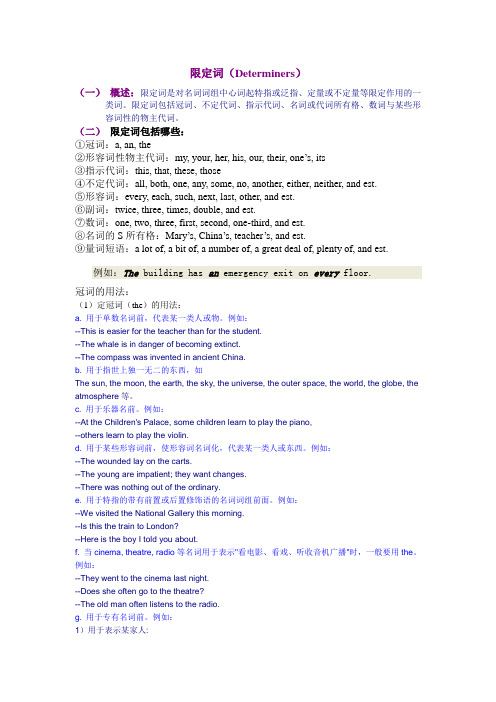
限定词(Determiners)(一)概述:限定词是对名词词组中心词起特指或泛指、定量或不定量等限定作用的一类词。
限定词包括冠词、不定代词、指示代词、名词或代词所有格、数词与某些形容词性的物主代词。
(二)限定词包括哪些:①冠词:a, an, the②形容词性物主代词:my, your, her, his, our, their, one’s, its③指示代词:this, that, these, those④不定代词:all, both, one, any, some, no, another, either, neither, and est.⑤形容词:every, each, such, next, last, other, and est.⑥副词:twice, three, times, double, and est.⑦数词:one, two, three, first, second, one-third, and est.⑧名词的S所有格:Mary’s, China’s, teacher’s, and est.⑨量词短语:a lot of, a bit of, a number of, a great deal of, plenty of, and est.例如:The building has an emergency exit on every floor.冠词的用法:(1)定冠词(the)的用法:a. 用于单数名词前,代表某一类人或物。
例如:--This is easier for the teacher than for the student.--The whale is in danger of becoming extinct.--The compass was invented in ancient China.b. 用于指世上独一无二的东西,如The sun, the moon, the earth, the sky, the universe, the outer space, the world, the globe, the atmosphere等。
专四语法专题复习:限定词

b) 前位限定词包括 all,both,half; double,twice,three times等; one-third,two-fifths等; what,such (a/ an) (跨类限定词)。
c)后位限定词包括 one,two,three等; first,second,third等;next,last,other,another等;many, much,(a) few,(a) little,fewer,(the) fewest,less,(the) least,more,most;several等; plenty of,a lot of,lots of,a great/large/good number of,a great/ good deal of,a large/ small amount of;such等。
个别限定词有跨类现象,如such既属于前位限定 词,又可归入后位限定词。由于它只是在such a ...和 such an …这样的搭配中属于前位限定词,而在与其 他限定词(some,any,no,all,few,another, other,many,one,two等)搭配时,such则是后位 限定词,一律放在上述这些限定词的后面,如some such,any such,no such,few such,one such等,因 此把它归入后位限定词。
限定词与三类名词的搭配关系
限定词与限定词的搭配关系
若干限定词用法比较
(1)能与三类名词搭配的限定词
有些限定词如the,some,any,no,other,whose以及my, your等物主限定词和名词属格(John’s,my friend’s)等能与三类 名词搭配。例如: the book the books the money my book my books my money my friend’s book my friend’s boods my friend’s money any book any books any money some book some books some money no book no books no money the other book the other books the other money whose book whose books whose money
限定词

限定词(determiner)限定词是在名词词组中对名词起特指,类指以及表示确定数量和飞确定数量等限定作用的词类。
英语的限定词包括定冠词(the),不定冠词(a,an),零冠词,物主限定词:my,your,his,her,our,your,their,one’s,its名词属格:John’s,Lily’s指示限定词:this,that,these,those,such关系限定词:whose,which疑问限定词:what,which,whose不定限定词:no,some,any,each,every,enough,either,neither,all,both,half several,many,much,(a) few,(a) little,other,another.基数词和序数词倍数词和分数词量词:A lot of, lots of, plenty of, a great deal of, a large/small amount quantity of, a great /large/good number of限定词与三类名词的搭配关系。
(U,C,Plural)能与这三类名词搭配的:The,some,any,no,other,whose以及my,your等物主限定词和名词属格(John’s,my friend’s)I have no time to write to you.It is still unclear whose houses were burnt last night.只能与单数名词搭配的限定词A(an),one, another,each,every,either,neither,many a, such a,etc.He is going to buy another car.只能与复数名词搭配的限定词Both ,two,three,another two/three,many, (a)few , several,these,those,a (great) number of等只能与复数名词搭配。
限定词的具体分类和用法详解
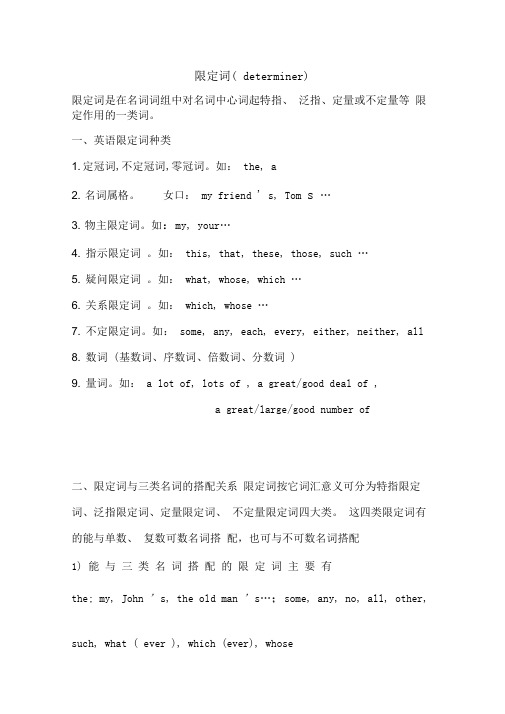
限定词( determiner)限定词是在名词词组中对名词中心词起特指、泛指、定量或不定量等限定作用的一类词。
一、英语限定词种类1. 定冠词,不定冠词,零冠词。
如: the, a2. 名词属格。
女口: my friend ' s, Tom s …3. 物主限定词。
如:my, your…4. 指示限定词。
如: this, that, these, those, such …5. 疑问限定词。
如: what, whose, which …6. 关系限定词。
如: which, whose …7. 不定限定词。
如: some, any, each, every, either, neither, all8. 数词 (基数词、序数词、倍数词、分数词 )9. 量词。
如: a lot of, lots of , a great/good deal of ,a great/large/good number of二、限定词与三类名词的搭配关系限定词按它词汇意义可分为特指限定词、泛指限定词、定量限定词、不定量限定词四大类。
这四类限定词有的能与单数、复数可数名词搭配,也可与不可数名词搭配1) 能与三类名词搭配的限定词主要有the; my, John ' s, the old man ' s…;some, any, no, all, other, such, what ( ever ), which (ever), whoseeg. the book - the books ------ the money,my book ---- my books -- my moneyJohn ' s book--- John ' s books -- John 's money2) 能与单数名词搭配的限定词。
如 :a (n) , each, every, another, either ,one, neither, many a, such a(n) …eg. each worker , every student ,either book ,another book3) 能与复数名词搭配的限定词。
语法解析-限定词
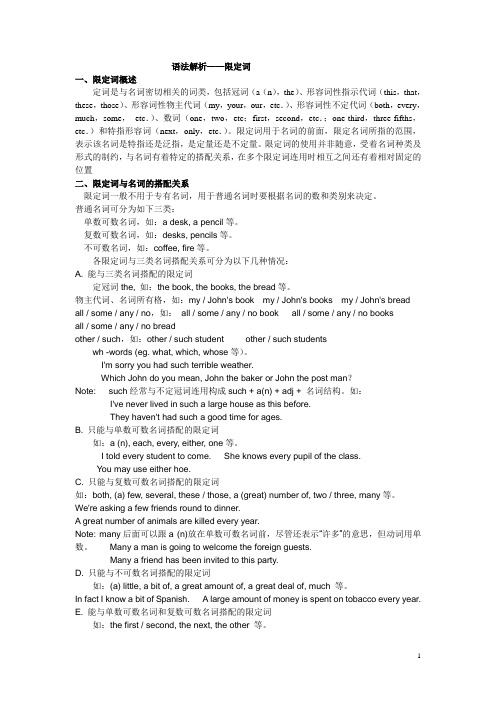
语法解析——限定词一、限定词概述定词是与名词密切相关的词类,包括冠词(a(n),the)、形容词性指示代词(this,that,these,those)、形容词性物主代词(my,your,our,etc.)、形容词性不定代词(both,every,much,some,etc.)、数词(one,two,etc;first,second,etc.;one-third,three-fifths,etc.)和特指形容词(next,only,etc.)。
限定词用于名词的前面,限定名词所指的范围,表示该名词是特指还是泛指,是定量还是不定量。
限定词的使用并非随意,受着名词种类及形式的制约,与名词有着特定的搭配关系,在多个限定词连用时相互之间还有着相对固定的位置二、限定词与名词的搭配关系限定词一般不用于专有名词,用于普通名词时要根据名词的数和类别来决定。
普通名词可分为如下三类:单数可数名词,如:a desk, a pencil等。
复数可数名词,如:desks, pencils等。
不可数名词,如:coffee, fire等。
各限定词与三类名词搭配关系可分为以下几种情况:A. 能与三类名词搭配的限定词定冠词the, 如:the book, the books, the bread等。
物主代词、名词所有格,如:my / John's book my / John's books my / John's breadall / some / any / no,如:all / some / any / no book all / some / any / no booksall / some / any / no breadother / such,如:other / such student other / such studentswh -words (eg. what, which, whose等)。
限定词

一、限定词的概念限定词(determiner)是在名词词组中对名词中心词起特指(specific reference)、类指(generic reference)以及表示确定数量(definite quantity)和非确定数量(indefinite quantity)等限定作用的词类。
名词词组除有词汇意义外,还有其所指意义(referential meaning),是特指(即指特写的对象),还是类指(即泛指一类人或物);是有确定的数量,还是没有确定的数量。
能在名词词组中表示这种所指意义的词类就是限定词。
二、限定词包括哪些词定冠词(defintite article):the;不定冠词(indefintite article):a, an;零冠词(zero article)物主限定词(possessive determiner):my, your, his, her, our, your, their, one's, its;名词属格(genitive noun):Tom’s, my mother’s;指示限定词(demonstrative determiner):this, that, these, those, such;关系限定词(relative determiner):whose, which;疑问限定词(interrogative determiner):what, which, whose;不定限定词(indefintite determiner):no, some, any, each, every, enough, either, neither, all, both, half, several, many, much, (a) few, (a) little, other, another;基数词(cardinal numeral):one, two, three, four, five…;序数词(ordinal numeral):first, second, third, fourth, fifth…;倍数词(multiplicative numeral):one thir d, two thirds…;分数词(fractional numeral):twice, three times…;量词(quantifier)a lot of, lots of, plenty of, a great of, a good deal of, a large of, a small amount of, a quantity of, a great of, a good number of…。
- 1、下载文档前请自行甄别文档内容的完整性,平台不提供额外的编辑、内容补充、找答案等附加服务。
- 2、"仅部分预览"的文档,不可在线预览部分如存在完整性等问题,可反馈申请退款(可完整预览的文档不适用该条件!)。
- 3、如文档侵犯您的权益,请联系客服反馈,我们会尽快为您处理(人工客服工作时间:9:00-18:30)。
限定词是对名词词组中名词起特指或 泛指、定量或不定量等限制作用的一 类词。
限定词与形容词的区别
尽管限定词和形容词都可以用在名词前面来 修饰名词,但二者在性质和用法上都存在着 很大的差别。 ⑴ 限定词用以限定名词所指的范围,对名词 起泛指或特指、定量或不定量等限定修饰作 用。而形容词则是用来表示名词的性质、特 征。例如:many/few/his children, naughty/lovely/clever children ⑵ 除了few, little, many, much外,限定词没有 比较级和最高级形式,大多数形容词有比较 级和最高级形式。
⑵ 从与数词搭配来看,注意二者词序上的差别: 1)another+数词+复数名词 2)数词+other+复数名词
顺便提及的是,从以上我们可知,虽然another 不能直接与复数名词连用,但其后可以先接数词 或few然后再接复数名词。如:another few weeks /a few more weeks,another few boys/a few more boys。
⑵ 在疑问句中,我们多数情况用any,但是在 表示我们期待一个正面回答或要鼓励对方说 “是”时,要用some在疑问句中。例如: ① Have you got any medicine to cure your cough? ② Would you like to give me some advice? ③ Can I have some more wine? ⑶ any可以表示“无论哪一个,任何一个”, 此时可用于任何类型的句子。例如: You can catch any bus. They all go to the railway station.
限定词的搭配
1、限定词与名词的搭配 各种限定词与不同“数”的名词搭配一般应遵循以下规则: ⑴ 只与单数可数名词搭配的限定词:a, an, each, either, neither, another, every, one, 等。 ⑵ 只与复数可数名词搭配的限定词:both, few, a few, fewer, a number of, many, several, these, those, 基数词。 ⑶ 只与不可数名词搭配的限定词:little, a little, less, much, a bit of, a great amount/deal of等。 ⑷与单数和复数可数名词搭配:序数词 the last man; the last men ⑸与不可数名词或复数可数名词均可搭配的限定词:a lot of, lots of, plenty of, more, most (6) 与单数名词和不可数名词搭配的限定词:this、that (7)与三类均可搭配的限定词:any, some, no, the, 物主限定词 (your, my…),名词属格(Tom’s, my mother’s)
⑴ 前位限定词
1)种类:前位限定词主要是用来说明名词的 数量,主要有三种①倍数词 例如:half my salary, twice my salary, double my salary, three times my salary;②分数词。例如:one third my salary, two-thirds my salary;③个体形容词: all and both, all my salary, both my salaries
4)不定量限定词 some, any, no, all, enough, ,more, most, plenty of, a lot of, lots of + C&U. little, a little, less, much, a great/good deal of, a great/good/large/small amount of, a bit of, a great/large volume of, volumes of + U. several, many, few, a few, fewer, the fewest, a large/great/good/small numb种限定词) 根据限定词在名词前的位置关系,我们把 限定词区分为三类:前位限定词(Predeterminer)、中位限定词(Central Determiner)和后位限定词(Postdeterminer)。 例如:They questioned both (前位限定词) the (中位限定词) last(后位限定词) two(后位限 定词) boys(名词).
2)共存性:前位限定词一般互相排斥,不能 共存。例如我们不能说:all half my salary, half double her income
⑵ 中位限定词
1)种类:①冠词the, a, an, 例如:all the book, half an hour, twice the size;②物主限定词my, your, his, her, our, their, 例如:all my money, all his money;③指 示限定词this, that, these, those, 例如:all these problems, twice that size, four times this amount;④ 名词属格John’s, his father’s 2)共存性:中位限定词亦彼此排斥,不能同时出现。 例如我们不能说:my the money, our these problems
限定作用
根据不同限定作用可分为以下四类: 1)特指限定词the, my, the old man’s, whose, such, the first, this, those, etc. 2)泛指限定词a, an, either, another, what, whatever, etc. 3)定量限定词half, double, twice, one-third, one, each, every, both, etc.
限定词种类:①冠词the, a, an;②物主限定词 my, your, his…;③指示限定词this, these…;④ 关系限定词whose, which;⑤疑问限定词what, which, whose;⑥不定限定词no, any, some, each, every, enough, either, neither, all, both, half, several, many, much, (a) few, (a) little, other, another;⑦ 基数词、序数词、倍数词、分数词; ⑧量词a lot of, lots of, plenty of, a great/good deal of, a large/small amount/quantity of, a great/large/good number of ;⑨名词属格Mary’s, John’s, his father’s
each, every的比较
相同点: each和every后面都只能接单数可数名词。 此时若作主语,句子谓语动词显然要用 单数。例如: ①Every/Each boy has a gift. ②Every man is the master of his own fortune.
不同点: ⑴ 二者最重要的区别是:each不仅用作限 定词,而且可用作代词;而every只能用作 限定词。如上句可改为:①Each has a gift.
⑵ 在意思上来看,二者有两点区别。 1) each用来指两个或两个以上的事物;而every 却总是指三个或三个以上的事物,不指两个。 There are a lot of trees on each side of the street. 2) 尽管each和every都可作“每一个”讲,但 两者意思并不完全一样。Every强调整体,相当 于all的意思;而each则表示个别的概念。当我 们用each时,我们强调的是一个一个不同的人 或事物。 ①We want every student to succeed in the exam. ②Each student has his own personal dream in
不定限定词 another, other
⑴ 从与名词搭配来看,another只能与单数可数 名词连用,表示不确定的“另一个”、“再 一个”。如another day,而不说another days, another water(可以说another cup of water)。 然而,other可与复数可数名词以及不可数名词 连用,表示不确定的“另外的”、“其余的” 人或物。如other boys, other fish。
我们还应该注意这两种用法的意思区别。 ①I will stay here for another three days. 意思 是“我还要在这里再呆三天”。“another+数 词+名词复数”这一结构的基本意思是“在原有 基础上的一个延续”。 ②I am always busy from Monday to Thursday, but I can come on three other days. 意思是“我 其他三天(Friday, Saturday, and Sunday)能 来”。“数词+other+名词复数”这一结构只是 单纯地表示“其他的…,另外的…”。
⑶ 后位限定词
1)种类:①基数词或序数词:one/first, two/second, three/third, four/fourth等等。例如: the two children, his fourth birthday;②一般序数 词:next, last, past, previous, subsequent, other, another等。例如:my next plan, our last meeting, your previous mistakes, her subsequent response; ③量词:few, many, several, little, less, more等。 例如:my many friends, our several achievements, the few friends that I have 2)共存性:不同于相互排斥的前位和中位限定 词,后位限定词可以同时出现在名词前。例如: my next two plans, several other people
